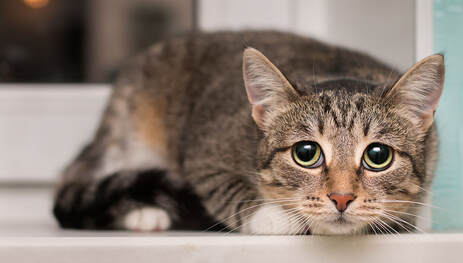 We all know that cats can be pretty challenging to read. So you might be asking, do cats get lonely? There's a misconception that cats don't like to make friends with other cats. So do cats need company? In reality, this will all depend on the cat. Some cats are very social, some prefer o be alone, and some can get sad quickly. There are certain factors to know if your cat will quickly get lonely. For instance, it will depend on their personality and age. Do Cats Get Lonely?It's a common idea that cats are independent and antisocial. But that doesn't mean they don't get sad. Compared to dogs, cats enjoy more of their solo activities, such as exploring and self-grooming. Their independence can be linked to their wild ancestors, who were lone animals. But since cats have evolved to be domesticated pets, they now crave companionship with their humans and other pets. So if you think that your cats rejoice when you leave the house, it's the opposite. Cats get lonely, and they also wait for you to arrive home. Some cats that are left alone all day without stimulation (playing with toys or other animals or humans) cause bad behavior. Signs That Your Cat is LonelyOvergroomingLonely cats tend to self-groom excessively. We all know that cats naturally are careful groomers. But if you feel that their grooming procedure begins to border on OCD-like behavior, it can signify that your cat is feeling lonely. Extreme Vocalization If your cat is usually quiet but suddenly becomes talkative, this can also signify that they are sad. It's their way of asking attention. Extreme vocalization can also mean that they are experiencing a lot of stress. It can be because of a new pet, a new baby, or maybe they're suffering from an illness that you don't know about. Loss or Increase in Appetite Changes in appetite can be caused by depression. Lonely cats tend to lose interest in their regular diet. On the other hand, changes in appetite can also be caused by certain illnesses, unfamiliar surroundings, or other psychological issues. Lethargy We all know that cats love to sleep, but lonely or depressed cats will sleep more. As the cat owner, if you notice changes in your cat's sleeping pattern, it can mean that they're unhappy. Low energy is expected for sad cats. It can also indicate that they suffer from other mental or physical problems. In addition, lethargy is also seen in cats because of stress, obesity, medication side effects, and boredom. Aggressive Behaviour Aggression is one of the most common signs that your cat is lonely. They tend to be aggressive once they know that their person is getting ready to leave. If your cat shows aggression when you're on your way out, it means they do not want you to leave them alone. They are telling you that they want to spend more time with you. Destructiveness Lonely cats show tendencies of destructiveness mostly because they are bored. When a cat is bored, they'll think of destructive or creative ways to entertain their minds. When you get home, you'll find your place messy or destroyed. This means that your cat is lonely or bored. Scratches on your sofa, climbing up your curtains, and shredding toilet paper are a few signs of destructive behavior. Litter Box Issues When you notice that your cat is spraying or squatting outside the litter box, it's advised to make sure that they don't have any medical issues first. Because litter box issues can also signify kidney or urinary tract problems. On the other hand, it can also mean that your cat is trying to tell you something. This can be his way of communicating his sadness at being alone. Additional Reasons Your Cat Gets Sad Besides leaving them at home, there are still other reasons your cat gets sad. Here are a few reasons your cat can get lonely: Illness A lonely cat can also show you that they have some underlying health conditions. In these times, it would be best to consult with your local vet instead of searching through the internet and guessing what's wrong. Your cat may be suffering from diseases and infections that can affect its mood. A few examples of these are fatty liver disease, dental disease, ringworm, and even cancer. Loss of a Loved One Yes, cats grieve at the loss of their loved ones too. Cats can develop a particular bond with humans or other pets over time. For instance, if your other pet, let's say a dog dies, you'll notice that the cat will be lonely and depressed. But don't you worry, as they will eventually recover. Cat Injury You will limit your cat's ability to play or do things they love once they start to experience an injury. For example, your cat loves to play outdoors and takes walks. If your cat suddenly can't do these things that he enjoys, sadness is unavoidable. Your Cat Gets Lonely, How To Make Your Cat Happy? Now that we've tacked the reasons and signs on why cats get lonely, let's discussed how we will turn that around. Always remember that a happy cat lives a longer and healthier life. Provide a Healthy Diet A healthy cat is a happy cat. The cat's diet will depend on its age. You shouldn't feed adult cat foods to kittens. There are specifically recommended diets for kittens, adults, and senior cats. As the pet owner, make sure that your cat receives a proper balance of nutrients that they need. If you're unsure about what to give, consulting with your vet or a veterinary nutritionist is your best bet. Visit the Vet As stated above, if your cat is healthy, he's also happy. He'll be able to do the things that he loves. From playing, running around, and maybe just staring at birds. An unhealthy cat can lead to depression as it won't be able to do the things they enjoy. Consult with your vet regularly to know how to take care of your pets properly. Playtime Take the time to play with your cat. One of their favorite games is playing hide and seek. It can be fun for both of you. Or maybe bring them new toys! Cat toys are not that expensive. Have you experienced buying some cat toys online, but when your box or package arrives, your cat was much happier to play with the box? In addition, cats enjoy playing with just a ball of yarn. Toys are physically and mentally stimulating, making them sharp and healthy. Petting or Cuddle Time Believe it or not, cats love to interact with their owners. Like dogs, they love to be petted (well, maybe not all the time)! A gentle scratch on their head or behind their jaw can make them feel safe and happy. In addition, petting a cat can also boost your mood. It can be a positive distraction to people suffering from mental illnesses like depression. Catnip According to researchers, their theory is that catnip triggers the cat's “happy” receptors in the brain when they smell it. But when eaten, it starts an opposite effect, and your cat becomes mellow. Cats react to catnip by rolling, flipping, rubbing, and zoning out. However, some cats become “zoomies” or hyperactive. They can also suddenly show aggression when you approach them. Can Cat Loneliness Be Helped By Getting a Second Cat? If you have one cat at home, you might have asked yourself this question. “Should I get a second cat?”. Cats have a reputation for being solitary animals. But cats can also benefit from having a friend or a buddy. Changes in a cat's behavior can indicate that they're lonely. But don't automatically assume that they need another kitty in the house. It's still best advised to consult with your vet if you feel any difference in their behavior. However, adding a second cat may not seem to be a bad idea. Adding a cat can help with your cat's sadness. When you're gone off to school or work, your cat will have a companion or playmate. But adding a new cat will not fix all the problems of a lonely cat. Adding a new cat is more challenging than it seems. Cats are also high-maintenance pets. And on rare occasions, they might not get along too well. Now you have two lonely cats to take care of. If your cat is old and has made a few cat friends throughout its life, it's less likely that they want another cat in the house. But if your cat is patient and has a good history of interacting with other cats. There's a great chance that it could work. Matching Your Cat to a Second Cat If you're still unsure about getting a second cat, you're maybe scared that they won't get along. I might have the solution for you. Try to look into rescues with multiple cats that are open for foster or a “trial period.” Take your newly chosen cat home, introduce it to your cat slowly, and try again with another if it doesn't work. But for more context, here's a step-by-step guide on how you can introduce a new cat to your old cat: Step #1: First Impressions Just like with us humans, first impressions are crucial when it comes to building chemistry. Two cats meeting for the first time may display anger or aggression. It would be best to keep them separated at first. This way, you'll be able to control their first meeting. Ensure that they have their food and water bowl, litter box, scratching post, and bed. They should also be able to smell and hear each other. A good technique is to feed the cats near a door that separates them so that they learn that coming together is a positive experience. You can add a few extra treats as well. After two-three days, switch their locations so they'll be able to analyze each other's smell. Step #2: Meeting Each Other After a few days or a week, if you see don't see them hissing, growling, or any signs of aggression at the door, this is an excellent time to introduce them to each other. Replacing the door with a temporary screen is an excellent method to let the cats see each other first. Once they see each other, ask a friend or a family member to help you give them treats behind them and call their name. Feed and play with them near the screen door for the next few days. Try to move closer to the barrier as the days go by . Step #3: Give Them Space The last step is allowing the cats to spend time with each other without the barrier. In this step, it is still crucial that you are there to supervise these first face-to-face meetings. It would be best to do this when they're both calm, for instance, after a meal or after playing. As they become more comfortable with each other, they can have their own space.
2 Comments
10/25/2022 11:11:05 am
Thank you for informative article. If follow your advices, perhaps all dogs will like this procedure😊
Reply
Pet sitting
10/25/2022 11:26:46 am
Oh sorry. This is my comment on another article about dogs.
Reply
Leave a Reply. |
Archives
July 2024
Categories |

 RSS Feed
RSS Feed